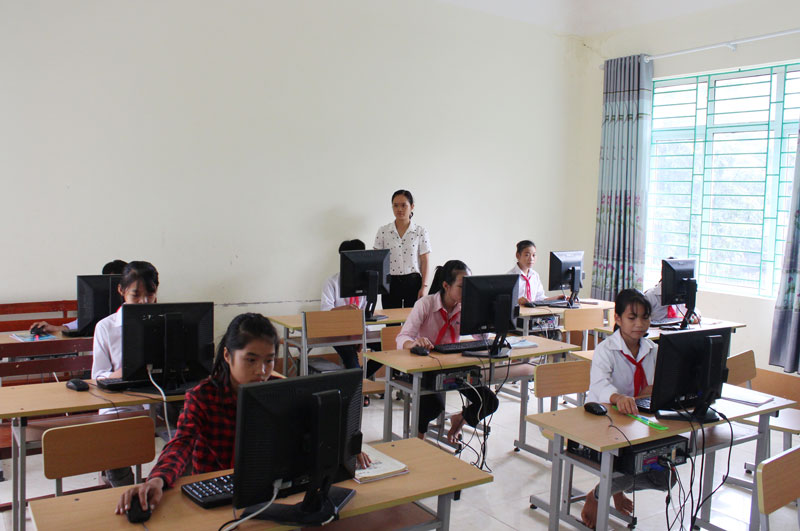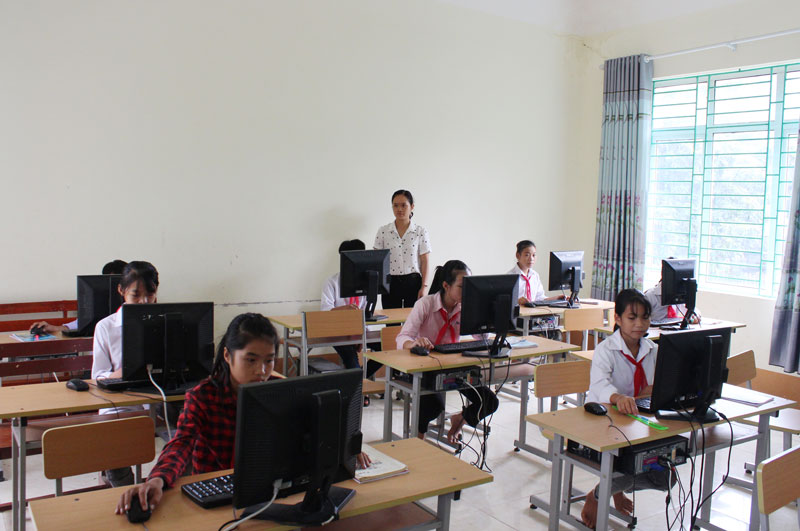
(HBO) – Education in Hang Kia, an especially disadvantaged commune in Mai Chau district, has increasingly improved.
Photo: Infrastructure at My Hoa
secondary school, Kim Boi district
If Mai Chau district sees improvement in education in Hang Kia, Lac Son
district records progress in Ngoc Son mountainous commune. Ky Son district has
paid attention to building a school up to national standards in specially
difficult Doc Lap commune while Yen Thuy district has invested in new schools
worth hundreds of billions VND in the poor communes of Lac Sy and Lac Luong. In
light of such, education panorama in remote, mountainous and especially
disadvantaged communes in the province has improved.
In particular, in order to increase education scale, network and quality in
poor areas, the provincial education and training sector has stepped up the
planning and development of a network of special schools under the province’s
plan on education development in poor areas for the 2015 – 2020 period.
Concluding the 2017 – 2018 school year, the province recorded 13 ethnic
boarding high schools with over 3,500 students, nine of them (nearly 70
percent) met national standards and 13 ethnic day-boarding high schools with
about 2,400 students. As scheduled in November 2018, the provincial education
and training sector will continue proposing the switch of two schools in especially
disadvantaged communes in Kim Boi and Lac Son districts to day-boarding high
schools to offer better learning environment to students.
Therefore, education quality in remote, mountainous and especially difficult
areas have improved considerably. For example, excellent students in ethnic
boarding schools during 2017-2018 academic year accounted for 13.6 percent, up
0.3 percent from the previous school year while students with good conduct made
up 89.3 percent, up 1.8 percent. During 2018 – 2019, the sector will improve
education quality, upgrade school infrastructure and equipment, maintain the
number of students, offer all possible support to students in especially
disadvantaged areas to study in ethnic boarding high schools after graduating
from boarding secondary schools./.
The emulation movement "Hoa Binh joining hands to build new-style rural areas” has been widely spreading, becoming a driving force that motivates the localities to renew rural landscapes and improve the material and spiritual lives of the residents. In this movement, the people play a central role-both as the main implementers and direct beneficiaries of its outcomes.
In response to the global digital revolution, Hoa Binh Newspaper is transforming itself into a modern and multi-platform media hub, blending cutting-edge technology with a restructured newsroom and a new generation of tech-savvy journalists.
Hoa Binh province’s Association of the Elderly recently held a conference to review the project on expanding the inter-generation self-help club model until 2025.
In a move to implement Resolution No. 57-NQ/TW, issued on December 22, 2024 by the Politburo, which targets breakthroughs in science-technology development, innovation, and digital transformation, the Hoa Binh provincial Department of Health has issued a plan to roll out the "Digital Literacy for All” campaign within the local health sector.
An Nghia Commune (Lạc Sơn District) is one of the communes that achieved the tha standard of the national new rural area in 2018. Entering a new development phase, the commune is now trying to meet the criteria for the advanced new rural development. With the strong political will and the public consensus, the commune is gradually overcoming the challenges to reach this goal, aiming for the sustainable development.



